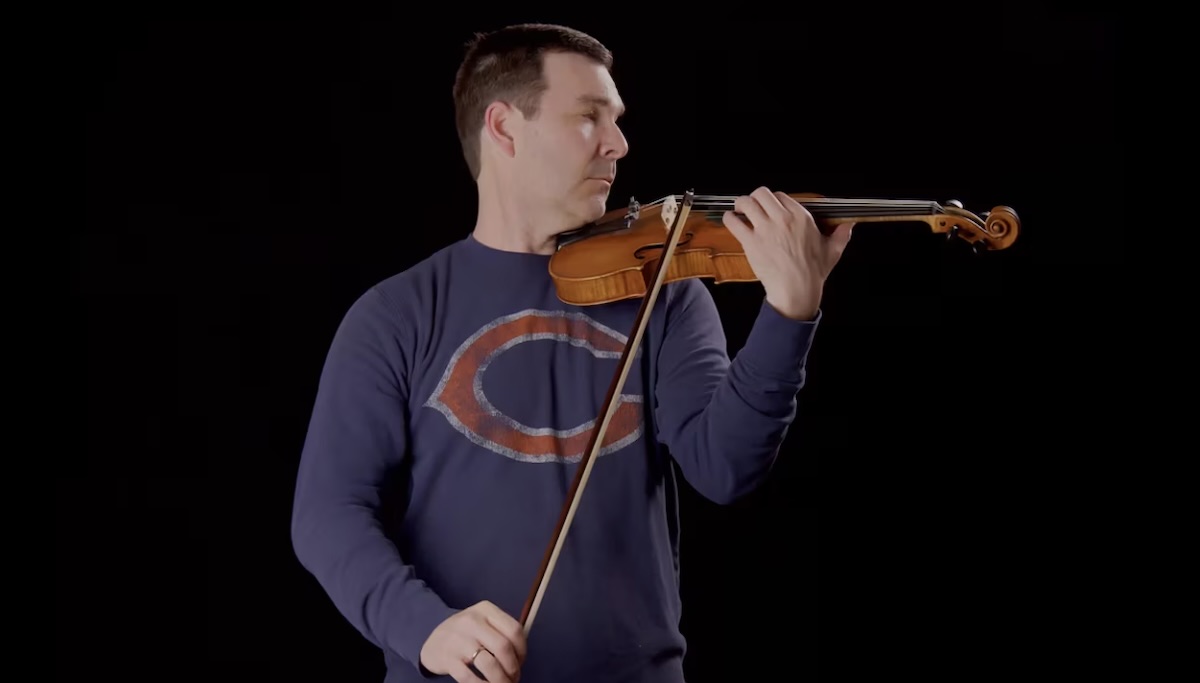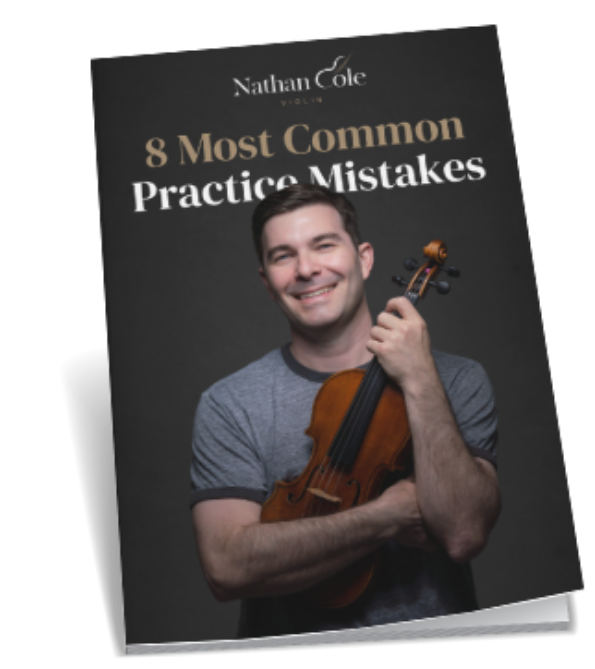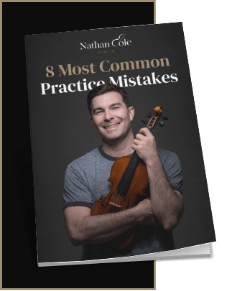Forte Only! Otto-Werner Mueller at Curtis
“What do you mean, he failed everyone?”
“I mean he gave everyone an F!” said my mother.
My parents were giving me some history on their college conductor at Wisconsin-Madison, soon to be my conductor at Curtis.
“How could he just give every member of the orchestra an F?” I asked, not sure whether my mother was exaggerating. But she wasn’t in the habit of exaggerating.
“It was 1967, and that was his first American job. He told the dean after the first semester, ‘None of them can play! So I gave them F!’ Well, he liked a few of us in the winds. But all the strings got F’s.”
“This was during Vietnam, by the way,” my father added. I understood. An F was not just an inconvenience at that time; it meant losing your college deferment from getting drafted.
“So that was it? Everyone failed?”
“Well, he told the dean he wasn’t changing his mind about anyone’s performance,” my mother answered. “He just said, ‘These are my grades, change them if you must!’ So the dean changed them.”
“Wow.”
“But say hello from us when you get to Curtis,” said my dad with a smile.
When I got there, and as I walked through Rittenhouse Square to my first orchestra rehearsal, I tried to remember what else my parents had told me about Otto-Werner Mueller. Or just “Mueller”, as he would always be known. He was tall, very tall, and not just compared to the men in my family. He towered over the orchestra, while its players shrank in fear. His accent, his hard German accent, was something they had imitated. They had made it seem as though he shouted everything.
Bruckner’s Fourth Symphony was the repertoire for this first week at school, and I had spent the previous night in my apartment practicing the second violin part. The notes didn’t make much sense to me since I had no context in which to place them. I would later discover that this context was called a “score”. I would also discover that Mueller had a special term of disdain for people like me, those who knew only their own part: “lousy one-line players!”
I still think about Mueller every day of my professional life, which consists mostly of playing in an orchestra. This morning, on reading the news that he had died, so many stories came flooding back. His voice runs through all of them, bellowing both praise and criticism, humor and anger. After one particularly brutal rehearsal at Curtis, where we felt like horses run through a steeplechase, a few of us wondered: what would Mueller want as his epitaph? It was a way to let three hours of built-up tension dissipate, and as we passed ideas around, we came to the inevitable answer: It would have to be “FORTE ONLY!”
Beginning with that very first rehearsal of Bruckner, Mueller made it clear that the music’s dynamic, its relative loudness or softness, was its single most important element. This meant both vertically (looking at the score, which instruments are most important right now?) and horizontally (is what I’m playing now more or less important that what comes before and after?). And by “made it clear”, I mean that any time anyone in the orchestra played the wrong dynamic, even in the first reading, Mueller shouted at them.
“Noooooooo!” Mueller’s voice sounded almost like a caricature, a super-villain in a B movie. Any sentence ending in a vowel rose in pitch before cutting off abruptly. The only other option was for the entire sentence to be delivered in a melodious monotone. “Rehearsal letter C is for-te on-ly!” He had hit upon one of a young musician’s greatest faults: playing anything marked “f” very loudly, and anything “p” somewhat less loudly. Under Mueller, dynamics had to be exact, the first time and every time thereafter. “Forte only”, directed to me in the second violins, might mean that the violas were marked fortissimo and therefore more important than me at the moment. “Forte only”, directed to the entire orchestra, meant that a general fortissimo was coming soon and that we had ruined it already by playing as loudly as we could.
For someone who had grown up thinking of music mainly as notes and rhythms, with dynamics as a kind of seasoning, this seemed like too much to handle. How could I be expected to read everything on the staff, and never miss a dynamic, not even once?
I soon realized that Mueller expected this because he was lenient in other areas. Notes, for example: up until the dress rehearsal at least, he seemed not to care if there were stray notes all over the orchestra. This was a radical idea to me! Violin teachers generally don’t cut too fine a distinction between a mezzo-forte and a mezzo-piano, but very few would let a wrong note slide by. I felt suddenly freed, although whatever mental energy had been loosed had to be put to work scanning for dynamics. Dynamics were everywhere! I even had to learn to read ahead, so that piano would sound more than an upcoming pianissimo.
Mueller also gave some latitude with ensemble, or “togetherness”. He expected that we would listen to each other and find our way as orchestral sections. But when there was a group tempo change or transition, there was one thing he would not forgive: inattention.
“Who will be the one?” he would say, stopping the orchestra just before a giant ritardando. “Who will be the one? Who will be looking down at his music stand,” and here he would perform a grotesque imitation of a fiddler sawing away with head down, “raise your hand now so I can throw you out in advance!” I never saw a raised hand. But it was certainly not an idle threat, for I saw many people “thrown out”.
The offenses included the above: not looking during a critical moment; talking to your neighbor; arriving late to a rehearsal; or reading a book or magazine, even if you were not playing the movement being rehearsed. While not an issue for string players, this last one certainly came up for woodwind, brass and percussion instruments from time to time. Once a brass player asked, “Maestro, will you be rehearsing the fourth movement before the break?” Mueller looked as though he had been slapped in the face with a dueling glove. “Oh? And did your teacher teach you that question?” This teacher would have been a member of the Philadelphia Orchestra. “Sooo? You think you have nothing to learn from the rest of the movements? You can leave now, and don’t come back for the fourth movement either! You are out!” We would watch the condemned pack his or her things and file out in front of everyone, knowing the shame they must be feeling, but at the same time just a bit envious that they would be spared further scrutiny under Mueller’s watchful eye.
There was another side to the giant. At the end of that first Bruckner rehearsal, I worked up the courage to do as my father had (perhaps jokingly) suggested. I approached the podium and stammered some sort of hello from my parents, flutists who had played with him in Madison all those years ago. “Oh yes! Cole! I remember your parents well. They fell in love under my direction.”
In fact, most of Mueller’s barbs were dipped in some less poisonous coating. As the rehearsals passed, we could recognize the hard Germanic humor for what it was. Those players who sat up front, and who played principal parts (thus earning more of his attention) had to develop thick skins. Insults such as, “Your playing is so boring, my socks are falling asleep!” were not to be taken personally. Or, to a principal woodwind who had let his hair grow out since Mueller’s last visit to Curtis: “I said piano possibile, not im-possibile! And by the way, bigger hair does not make you a better artist. Try a bigger brain!”
Only someone intimately familiar with the ins and outs of each instrument in the orchestra could criticize each one and truly hit home. To the violins, demonstrating a bow stroke that skipped quickly over the entire middle, the “meat” of the bow: “Violins! You play like you rosin!” Or to the strings as a whole, this time critiquing our vibrato: “Beethoven was not meant to sound as a Hammond Organ!” And of course, to a percussionist who had played out of time, one too many times: “A percussionist without rhythm? What else is there?”
And just as you hurt the ones you love the most, Mueller (at one point a trumpet player) relished lighting into the brass section for the unpardonable sin of playing too loud. Of all the “forte only” directions that we received, a disproportionate number went to that back right corner of the orchestra. In fact, this line found its way into the annual Curtis Holiday Party, where a group of us performed The twelve days of Mueller, with “a partridge in a pear tree” replaced by “the brasses play one forte on-LY!”
Mueller even changed dynamic markings for entire symphonies when he felt that they were inappropriate for modern orchestras. Schumann, for example, got special treatment, as did Wagner. Wagner, Mueller reminded us, wrote his music specifically for the theater in Bayreuth which featured a recessed orchestra pit with an overhanging ceiling. Thus, the strong dynamics in the brass would have made sense in that context. But not in our rehearsal room, and especially not with the “ugly American brass playing” that he despised.
Mueller’s relationship with his adopted country was multifaceted. He chastised those of us who didn’t vote every chance we got, and constantly extolled the freedoms that we enjoyed as Americans, or at least as students in America. His childhood in interwar Germany had clearly instilled in him a horror of authoritarian government. If he occasionally took these feelings out on us, we’d wait for the storm to blow over. He berated us for our “warlike” tendencies as Americans, and pointed out how they influenced our playing. When he was in a gentler mood, he compared our playing to “American encyclopedia salesmen, shoving your foot in the door when nobody invited you!”
Perhaps it was fitting that such a complex man would embrace Beethoven above all other composers. Beethoven, who declared himself to be superior to royalty, yet depended on wealthy patrons for his livelihood; who respected the traditions and structures of music, yet changed them forever; whose compositional style seemed impulsive yet meticulous. Beethoven was the one composer whose dynamics needed no tampering. Follow them exactly and the structure would reveal itself. But get too caught up in the moment, and the structure would fall. I remember Mueller’s criticism when we played a passage too “horizontally”, as melody only, without concern for the big picture: “If you want to play a melody, play Donizetti. God gave the gift of melody to Donizetti.” This last line he shouted: “To Beethoven he gave everything else!” Mueller was always fond of reminding us that Beethoven’s inspiration was George Frideric Handel, a composer rarely mentioned in the same breath as Ludwig Van. I can never play the last movement of Beethoven’s Fifth Symphony without remembering Mueller’s analysis of it as an ecclesiastical work in the mold of a Handel oratorio.
Mueller never discussed religion or faith with us, except his contempt for strict religious doctrine and the insincerity of many so-called “leaders”. I always believed that the music was spiritual nourishment enough for him. There was, however, a definite morality about his music-making and teaching. There were clearly right and wrong ways to play. Like Luther, Mueller seemed to believe in “original sin”: that we were all lousy musicians to start with, but through the grace of the best composers, we were saved. Of course, unlike Luther, Mueller demanded that we also constantly perform good works to earn our salvation. Otherwise we would be cast out… of rehearsal, at least.
Otto-Werner Mueller will be best remembered as a teacher of conductors. Those who studied under him will undoubtedly have many more stories to tell. Fortunately, we “one-line players” were able to see some of his teaching through our participation in Lab Orchestra, a group that met once a week so that the Curtis conducting students could perform with an orchestra in front of their teacher. It’s worth a detour to mention how Mueller chose his students at Curtis, because it came from the traditional European model of becoming a conductor. The old process ran in this way: after a thorough grounding in counterpoint, composition and keyboard study, a young hopeful would become a rehearsal pianist for an opera company; work his way up to a bigger opera company; become a “cover conductor” for the opera, in case something should happen to the conductor; become conductor of his own opera company; and finally, become conductor of either a bigger opera company or an orchestra.
For us instrumentalists, the process seemed more linear: get good at your instrument, get better, get into a great school, get better still! So it seemed strange when, every spring, we would devote a Lab Orchestra session to trying out Mueller’s finalists for his conducting studio. Some of them seemed totally intimidated by the occasion, their motions awkward and devoid of authority. In short, they weren’t very good conductors. But every single one had passed a battery of tests that none of us had a prayer of passing. They had to take fiendish written exams in counterpoint and dictation. They had to demonstrate proficiency on at least one orchestral instrument. And then there was the keyboard portion! Candidates had to sight-read, in open score, (4 different clefs: soprano or treble, alto, tenor and bass) Bach chorales. They then had to transpose the chorales into different keys chosen by Mueller. Finally, they had to “reduce” an orchestral or opera score onto the two hands of the piano at sight. The list of candidates who could do all of this satisfactorily was a short one indeed. Small wonder that few of them were also wizards with a baton.
This last part Mueller was confident he could teach, and over time he did. Those of us in Lab watched our fellow students grow as conductors in front of our eyes, and his. He could forgive just about any lapse in baton technique. But he would not forgive gaps in knowledge, analysis or score study. He knew all too well that the authority an orchestra grants a conductor lasts only as long as they sense his or her integrity on the podium. Any sense of “getting by” or fakery on the part of the maestro, and the orchestra disperses like a herd of livestock. So most of each week’s work for the conductors took place out of our sight: in group sessions with Mueller, and in individual score analysis.
Mueller’s own podium technique was spare and grew out of his enormous physical stature. He had our attention and he knew it. When, during a Lab session, he would sweep a student off the podium to show a beginning or a transition, he could barely contain his joy at being able to demonstrate, with a simple gesture, what had seemed impossible for his young charge. We would delight in the feat as well. But it made us want all the more to help our fellow student the next time, to strike a blow for us against Mueller. He knew this dynamic well and exploited it.
His least favorite conductor mannerisms have become mine as well. First, the tendency to show the beat with both hands at once, otherwise known as “marching band syndrome”: Mueller would have none of it. “Time-beater! Is that all you will show? They don’t need you at all!” Time-beater was his most concise damning of a conductor, as one-line player was for the instrumentalists. For Mueller, the right hand alone showed time, while the left hand remained free to show everything else: dynamics, character, cues, etc. There was also bouncing on the podium, a non-technique that I see far too often to this day. Mueller’s solution to this problem was simple and effective: require the bouncer to sit on a stool while conducting. Without any support from the legs, many students found to their dismay that they had very little to say with the upper body!
Mueller’s scrutiny was especially intense any time a conductor had to start the orchestra. The difference between a preparatory beat and a “real” one confounded many of Mueller’s new students, and he would encourage the Lab Orchestra to go ahead and come crashing in if there was any ambiguity. And if, during a session, the conductor needed to stop and restart the group, Mueller insisted on proper “counting” etiquette between podium and orchestra. Even professional conductors often waste time in rehearsal by counting out loud before letting the orchestra know what they’re counting: “11, 12, 13, 14… after D. Go!” Instead, Mueller made certain that his conductors began with, “Count with me please, after D…” Any time a Mueller alum conducts an orchestra of mine, I can count on those words bringing me back to those days in Lab.
One Lab tradition that goes back to my parents’ time with Mueller was his inclusion, for the final candidates for his studio, of a portion of Stravinsky’s The Rite of Spring. This always proved a stern test for the finalists, and of course for the orchestra as well! At least the candidates had the small comfort of knowing that Mueller already admired their potential at that point. And lest we in Lab thought too highly of ourselves while watching some candidates crash and burn, Mueller gave us an opportunity before letting them into the rehearsal room. He would ask for volunteers from Lab, perhaps three each year, to attempt the Rite. Finally, in my fourth and final year at Curtis, I accepted the challenge. I did, however, lessen my own difficulty by conducting from my old familiar second violin part rather than trying to follow the full score as the candidates would have to do! With heart racing, I stood on the podium and for the first time felt Mueller’s eyes narrowed at me. Staring only at the page, I raced through the excerpt and, to my surprise, came out relatively unscathed. Of course, I had only fulfilled the requirements of a “time-beater”, giving no cues and showing no character. But it was enough to earn raised eyebrows and a compliment from the master. And much like someone who plays the lottery once and wins a modest sum, I decided to quit conducting while I was ahead.
Mueller could never have led a professional orchestra, something I’m sure he would have conceded. Within a week he would have gone on a Godzilla-like rampage and decimated the group, beginning with the brass. In every sport, there are those coaches who thrive in the college game and those who do well with the pros. Phil Jackson, 11-time champion coaching the Bulls and Lakers, deftly handled massive egos and passed around motivational books. Bob Knight, while coaching the Indiana University basketball team to three championships, threw chairs and kicked his players. Yet these players for the most part revere him to this day. Those who went on to professional careers valued that portion of their lives they spent pushing themselves toward the most exacting standard, simply because someone demanded it of them. Mueller occasionally stalked through the orchestra and put his hands on players to make his point, behavior that today would not only be frowned upon but would most likely result in his dismissal.
At times Mueller’s demands seemed impossible to satisfy, particularly in the case of his female conducting students. Female conductors, of course, did not exist during his formative years. His attitude toward them swung from exasperation to admiration, with mostly bemusement in between. During Lab sessions, they seemed to have two choices: “be themselves”, in which case he would berate them for lacking authority both physically and intellectually; or imitate their teacher, after which he would criticize them for being inauthentic or “trying to be a man”. It must have been clear to him that his female students’ knowledge and analysis, those attributes he prized most, were the equal of the males. But whether his teaching style toward them sprang from a true ambivalence about women on the podium, or a desire to toughen them up for what would surely be a hard road ahead, the difference was obvious to all of us in Lab. In fact, this attitude extended toward women in the orchestra, who were more likely to be criticized or even punished for offenses such as talking or not paying attention. Men were more apt to be penalized for how they played, or for “showing off”.
Performing with Mueller felt like an extension, perhaps a culmination, of his rehearsal process. There were no surprises once the curtain was raised. We hoped to stay true to what we had worked on during the week, but we did not expect to soar above those expectations. Mueller’s aversion to showing off applied as much to himself as to any of us, but at times we could have used a jolt of electricity from our leader. I recall a performance that included Strauss’ Don Juan, after which a chamber music coach of ours remarked, “It’s like he’s got the keys to a Ferrari and won’t drive it more than 35 miles an hour!”
We knew, from conversations with our teachers and other mentors, that the musical world for which Mueller was preparing us had vanished long ago. We wouldn’t be joining orchestras composed mainly of white men. And those orchestras wouldn’t be playing primarily Beethoven, Bruckner and Wagner. We would not be hired based on our fidelity to the printed dynamics. And just as in other walks of life, the show-offs and the fakers would often rise to the top. But he knew, as we have all come to know, that without spending formative years devoted to the ideal in musical performance, you can never hope to claim it later in life. In my career, I have encountered many players who made me exclaim, “Didn’t anyone ever yell at them, tell them they can’t play like that?” Maybe nobody ever did. But all of us who studied under Mueller remember: he did.
Anthony Tommasini wrote, in a recent article for The New York Times, “I’ve long argued that orchestras everywhere, but especially in America, worry too much about how they play and not enough about what they play and why they play it.” It’s true that the ever-expanding choices today’s audiences have for their entertainment dollar make it crucial for orchestras to re-examine their programming. But it’s important not to allow the pendulum to swing too far away from musical quality. Already many concert reviews focus only on the superficial aspects of the performance: who, what and where, without even attempting to delve into the emotional impact of the playing. To Mueller’s mind, the need to perform to the highest standard dictated not only how to play, but the choice to play music that demanded such a standard. My parents tell me that while they played under Mueller in Wisconsin, the winner of the student concerto competition played the Tchaikovsky piano concerto. At the dress rehearsal, the soloist played his prepared cadenza, which turned out to be an unorthodox creation. Mueller’s eyes widened, and he interrupted the performance. “What is this?”
The student replied, “It’s my cadenza.”
“Who composed it?”
“My teacher.”
“I see…If Tchaikovsky had composed such [garbage], I would never play him!”
Some mentors pass on and leave us conflicted about how to honor them. But it’s clear to me that the best way to honor Otto-Werner Mueller is to continue the work that he cherished: to devote ourselves to performing great music with integrity; to turn from empty gestures to genuine expression; and to become, and support, leaders who recognize the immense power of the music that we champion. Time-beaters and one-line players alike, we are all in his debt. And I’ll hear his voice every time I see a single forte on the page.
Comment section
2 thoughts on “Forte Only! Otto-Werner Mueller at Curtis”
Leave a Reply

Scales: The Road
to Repertoire
Even if you’ve never played a scale before, violinist Nathan Cole of the Los Angeles Philharmonic will guide you through scale routines that meet you where you are, and build progressively alongside your playing.









I played in the Tulsa Phil for four years under Maestro Franco Autori.
One time at dress rehearsal in the concert hall he wasn’t too happy. He ordered all the lights turned out. We heard a rustling, then he lit a whole matchbook that he
held above his head. Then he in canted, “will all evil spirits get the hell out of here.”
It worked. LMAO.
A beautiful obituary with rich artistic contents, thank you so much Nathan for sharing with us your precious memories! This is one of those things I’d like to come back every so often and read again, to help my deeper understanding.
To catch a glimpse of the real cost one has to pay to embrace music, the level of dedication, through your article, is a blessing to me! What a fortitude.